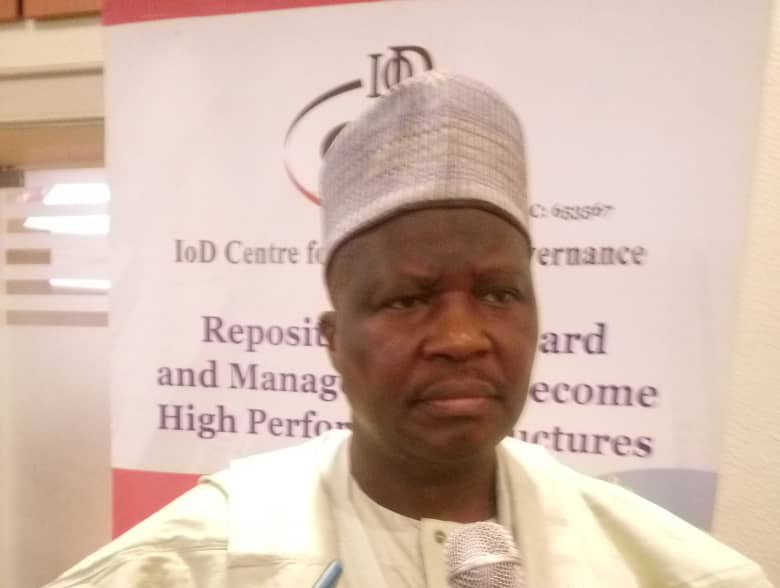… As Roundtable advocates collaboration between public and private sectors
The Chairman, Institute of Directors Centre for Corporate Governance (IoDCCG), Alhaji Shuaibu Idris has said that tackling illicit financial flows is a matter of survival for Africa’s development.
Idris stated this in his opening remarks at a public/private sector dialogue with the theme “Strengthening Anti-Money Laundering/Countering Terrorists Financing And Curbing Illicit Financial Flows In Nigeria and West Africa”, put together by the Centre for International Private Enterprise (CIPE), USA and Institute of Directors Centre for Corporate Governance (IoDCCG) in Lagos on Thursday.
He observed that Africa not only lose about 5% of continental Gross Domestic Products (GDP) annually to illicit capital flight but the proliferation of illicit financial flows enables terrorist activity and insecurity from the Lake Chad region which includes Nigeria spanning the Sahel region adding that the losses to economic growth, trade opportunities and social development was, therefore, unquantifiable.
According to him, “This constitutes a drain in Africa’s foreign exchange reserve, reduce efforts to enhance domestic resource mobilization, contract investment inflows and contribute to low social development indicators including poverty and inequality.
“It is a collective responsibility and a priority for the private sector, civil society and government to address systemic challenges and gaps undermining the efforts to curb IFF and ML/TF including lack of transparency, weak accountability mechanisms, under capacity, resource mismatch and others that can be identified through dialogue and strategic engagement of this nature.”
He, however, commended CIPE and the centre’s management for championing events such as this which according to him, lent credence to the propagation of sound corporate governance principles and practices, being the core mandate of the centre.
Meanwhile, the roundtable recommended in its communique that there can be no success in curbing AML/ CTF without collaboration between the public and private sectors adding that public/ private partnerships inform risk based decision making to allocate resources efficiently in addressing identified vulnerabilities even as it insisted that information needed to flow bi-directionally and technology could assist this.
While pointing out that generating trust between the private and public sectors was key, the roundtable maintained that information sharing must be protected on both sides while insisting that privacy and the presumption of innocence must be protected.
It went on to posit that knowledge gaps must be filled and the capacity of members of partnership must be built to create a level field. Virtual assets is a critical area where knowledge gaps are rampant.
The roundtable continued, “Smart regulatory framework for the crypto space is not only important for curbing crime but also increasing trust in the crypto industry with the consequence of increased adoption. Partnering with Blockchain Analytics firms is critical.
“Scope of public private partnership should be expanded to include non-conventional actors such as the communications sector and the Judiciary.
“KYC is central for due diligence. Beneficial ownership data is critical. A centralized data source is needed.
Technology is key in this regard.
“The digitisation of the financial sector requires new risk management processes. Nigeria needs its own crypto currency regulation. Such a regulation should mandate compliance to AML/CTF rules. Fintech education programs are needed to support this process.
“Regulations need to be enforced. Bill passed in the Senate criminalizes ransom payment. For this to work, complementary efforts to secure citizens and recover kidnapped persons is key. Laws have to be practicable in the socio-political context to be effective.
“On privacy, the NDPR is in place but the level of compliance and enforcement is critical.
“Mass public education/reorientation on the impacts of ML/TF is needed. The media and NOA play an important role in this regard.
“Banks cannot hide under data protection laws to fail to disclose information regarding the subject of AML/CFT.
“Organizations should have an internal code of ethics guiding AML/CFT.
“The Real Estate sector needs robust self regulation and strong education and awareness as a first line of defense against AML/ CTF. Real Estate companies must understand their gatekeeping responsibility and pay attention to red flags for money laundering activities.
“There is a distinction between the residential and commercial real estate sectors as the issues are unique to each sector. More research is needed especially on the commercial side.
“Beneficial ownership of companies buying real estate internationally should be available for proper due diligence.
“Non disclosure suspicious transactions/ activities should carry penalties by law.
“EFCC should instill confidence that people are not guilty until proven innocence to encourage disclosure and self regulation.
“Whistleblower protection is critical if disclosure is to be encouraged. EFCC’s eagle eye application for reporting potentially solves this problem.
“Need to share success stories of what is working in the country and across the region.
“Incentives need to be created for companies to do the right thing. CIPE/ IODCCG are doing this through Ethics First.”
Photo: Shuaibu Idris, Chairman, IoDCCG.
Send your press invite, news, press releases/articles to augustinenwadinamuo@yahoo.com. Also, follow us on Twitter @ptreporters and on Facebook on facebook.com/primetimereporters or call the editor on 07030661526, 08053908817.

